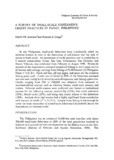A survey of small-scale fishermen's credit practices in Panay, Philippines
Share
Abstract
In the Philippines, small-scale fishermen have traditionally relied on informal lenders in view of the limitations of self-finance and the lack of access to bank credit. An assessment of credit practices and its availability in 5 coastal communities: Culasi, San Jose, Concepcion, San Dionisio, and Nueva Valencia, was conducted from February to August 1990. Ninety-six percent of the respondents surveyed considered fishing as their major source of income with average earnings from fishing of P1982/month (25 Philippines Pesos = US$1.). Hook and line, gill net, jigger, and spear are the common fishing gears used. Credit was obtained by 83% of the fishermen surveyed and was used mainly for food and household expenses, and fishing operations. Credit ranging from P20 to P20,000 was obtained from informal or non-institutional sources, such as relatives, friends, small store owners, and traders. Informal credit sources were preferred over formal or institutional sources for the following reasons: accessibility (51%), fast credit extension (31%), liberal terms (25%), and being only source known to the fisherman (18%). Analysis showed that income has a highly significant linear correlation with amount of credit (r2=0.1311). Income from fishing is not enough to cover the basic necessities of a small-scale fisherman's household, hence the dependence on informal credit.
Suggested Citation
Samonte, G. P. B., & Ortega, R. S. (1992). A survey of small-scale fishermen's credit practices in Panay, Philippines. Philippine Quarterly of Culture and Society , 20(4), 300-316. http://hdl.handle.net/10862/1395
Subject
Collections
- AQD Journal Articles [1248]

